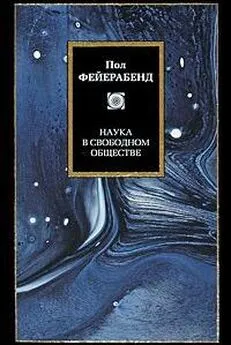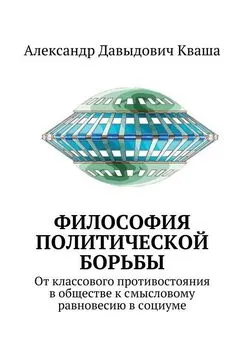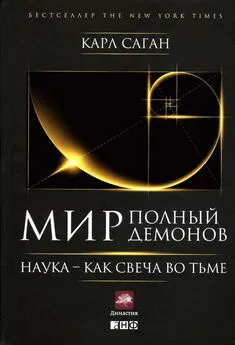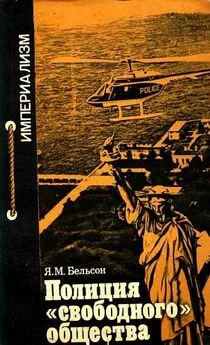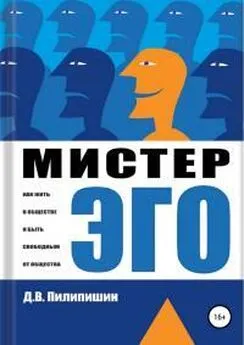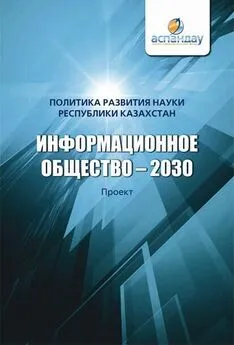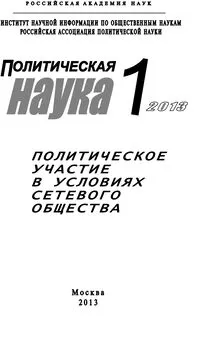Пол Фейерабенд - Наука в свободном обществе
- Название:Наука в свободном обществе
- Автор:
- Жанр:
- Издательство:АСТ МОСКВА
- Год:2010
- Город:Москва
- ISBN:978-5-17-040288-5
- Рейтинг:
- Избранное:Добавить в избранное
-
Отзывы:
-
Ваша оценка:
Пол Фейерабенд - Наука в свободном обществе краткое содержание
Пол Фейерабенд - американский философ, автор знаменитой «анархистской теории познания».
Как определить соотношение между разумом и практикой? Что такое «свободное общество», какое место отведено в нем науке, какую роль играют традиции? На чем должна быть основана теория, которая могла бы решить основные проблемы «свободного общества»? Об этом — знаменитая работа П. Фейерабенда «Наука в свободном обществе», впервые публикуемая на русском языке без сокращений.
Наука в свободном обществе - читать онлайн бесплатно полную версию (весь текст целиком)
Интервал:
Закладка:
70. Feyerabend P.K. Problems of Empiricism: Philosophical Papers, vol. 2. Cambridge, 1981.
71. Feyerabend P.K. Realism, Rationalism and Scientific Method. Philosophical Papers. Cambridge, vol. I, 1981; vol. II, 1983.
72. Feyerabend P.K. Wissenschaft als Kunst. F. am Main, 1984.
73. Feyerabend P.K. Farewell to Reason. London, 1987.
74. Feyerabend P.K. Against Method, 2nd revised ed. London, 1988.
75. Feyerabend P.K. Three Dialogues on Knowledge. Oxford, 1991.
76. Feyerabend P.K. Killing Time: The Autobiography of Paul Feyerabend. Chicago, 1995.
77. Feyerabend P.K. Conquest of Abundance: A Tale of Abstraction Versus the Richness of Being, ed. B. Terpstra. Chicago, 1999.
78. Feyerabend P.K. Knowledge, Science and Relativism: Philosophical Papers, vol. 3, ed. J. Preston. Cambridge, 1999.
79. Fritz K. Antike und moderne Tragodie. Berlin, 1962.
80. Galilei G. Dialogue Concerning The Two Chief World Systems, tr. S. Drake. Berkeley, 1953. Галилей Г. Диалого двух главнейших системах мира. — Галилей Г. Избранные труды в 2-х томах. Т. 1. М., 1964.
81. Gellner Е. Beyond Truth and Falsehood. — British Journal for the Philosophy of Science, vol. 26, 1975, pp. 331—342.
82. Gershenson D.E. and Greenberg D.A. The «Physics» of the Eleatic School: A Reevaluation. — The Natural Philosopher, vol. 3, 1964.
83. Gingerich О. Crisis’ vs. Aesthetic in the Copernican Revolution. — Vistas in Astronomy, vol. 17, 1975, pp. 85—95.
84. Godelier M. Mythe et histoire: ^flexions sur les fondements de la реп8ёе sauvage. —Annales. Economies , Socidtds, Civilisations , vol. 26, 1971, pp. 541—558.
85. Gottsched J. Chr. Schriften zur Literatur. Stuttgart, 1972.
86. Grant E. A Source Book in Medieval Science. Cambridge (MA), 1974.
87. Hanke L. All Mankirifl is One. A Study of the disputation between Bartolom6 de Las Casas and Juan Gi^s de Sepiilveda in 1550 on the intellectual and religious capacity of the American indians. DeKalb(IL), 1974.
88. Hanson N.R. Patterns of Discovery. Cambridge, 1958.
89. Hanson N.R. The Mathematical Power of Epicyclical Astronomy. — Isis , vol. 51, 1960, pp. 150—158.
90. Harrd R. Review of P.K. Feyerabend’s Against Method . — Mind, vol. 86, 1977, p. 294-298.
91. Hattiangadi J.N. The Crisis in Methodology: Feyerabend. — Philosophy of the Social Sciences, vol. 7, 1977, pp. 289—302.
92. Hattiangadi J.N. Playphilosopher. — Philosophy of the Social Sciences, vol. 8, 1978, pp. 59—61.
93. Heisenberg W. Physics and Philosophy: The Revolution in Modern Science. New York, 1958. Гейзенберг В. Физика и философия. Часть и целое. М., 1990.
94. Heilman C.D. The Comet of 1577: Its Place in the History of Astronomy. New York, 1944.
95. Heilman G. Against Bad Method. — Metaphilosophy, vol. 10, 1979, pp. 190-202.
96. Herz N. Keplers Astrologie. Wien, 1895.
97. Heyerdahl T. The Ra Expeditions. New York, 1972. Хей-редал Т. Pa. М., 1970.
98. Hodson R.R. (ed.)The Place of Astronomy in the Ancient World. Oxford, 1974.
99. Howson C. (ed.). Method and Appraisal in the Physical Sciences. Cambridge, 1976.
100. Illich I. Medical Nemesis. Random House, 1976.
101. Jantsch Е. Design for Evolution. New York, 1965.
102. Johnson F.R. Astronomical Thought in Renaissance England. Baltimore, 1937.
103. Jung C.G. Synchronicity. An Acausal Connecting Principle. — In: The Collected Works of C.G. Jung. Vol. 8. London, 1960.
104. Jungk R. Die Atomstaat. Vom Fortschritt in die Unmen-schlichkeit. Miinchen, 1977.
105. Kamen H. The Rise of Toleration. New York, 1967.
106. Kepler J. Conversation with Galileo’s Sidereal messenger, tr. E. Rosen. New York, 1965. Кеплер И. Разговор с звездным вестником. — В: Кеплер И. О шестиугольных снежинках. М., 1982. С. 33—68.
107. Коугё A. From the Closed World to the Infinite Universe. Baltimore, 1957. Койре А. От замкнутого мира к бесконечной вселенной. М., 2001.
108. Krafft F. Copernicus retroversus, I: Copernicus fulfills Greek astronomy. — In :Colloquia Copernicana III. Wroclaw, 1975. Pp. 113-123.
109. Krafft F. Copernicus retroversus, II: Gravitation und Kohasionstheorie. — In: Colloquia Copernicana IV. Wroclaw, 1975. Pp. 63-76.
110. Kristeller P.O. Renaissance Thought. I and II. New York, 1961, 1965.
111. Kuhn T.S. The Copemican Revolution: Planetary astronomy in the development of Western thought. Cambridge (MA), 1957.
112. Kulka T. How Far Does Anything Go? Comments on Feyerabend’s Epistemological Anarchism. — Philosophy of the Social Sciences, vol. 7, 1977, pp. 277—287.
113. Lakatos I. and Zahar E.G. Why did Copernicus supersede Ptolemy? — In: Westman R.S. (ed.). The Copemican Achievement, Berkeley-Los Angeles-London, 1975.
114. Lenin. Ленин В.И. Детская болезнь «левизны» в коммунизме. Пекин, 1965.
115. Levi-Strauss С. The Savage Mind. Chicago, 1966 [Levi-Strauss C. La Pensde sauvage. Paris, 1962]. Леви-Стросс К. Первобытное мышление. М., 1994.
116. Loemker L.E. (ed.). Gottfried Wilhelm Leibniz. Philosophical Papers and Letters. Dordrecht, 1969.
117. Mach E. Analyse der Empfindungen. Jena, 1900. Max Э. Анализ ощущений. М., 2005.
118. Mailer N. Of A Fire on The Moon. London, 1970.
119. Manuel F.E. The Religion of Isaac Newton. Oxford, 1974.
120. Mao Tse-Tung. Oppose stereotyped Party Writing. — In: Selected Works of Mao Tse-Tung. Vol. 3. Peking, 1965.
121. McEvoy J.G. A «Revolutionary» Philosophy of Science: Feyerabend and the Degeneration of Critical Rationalism into Sceptical Fallibilism. — Philosophy of Science , vol. 42, 1975, pp. 49-66.
122. Mill J.S. On Liberty. — In: Cohen M. (ed.). The Philosophy of John Stuart Mill. New York, 1961. Милль Дж. С. О свободе. СПб., 1906.
123. Millikan R.A. Albert Einstein on His Seventieth Birthday. — Reviews of Modern Physics , vol. 21, 1949, pp. 343— 345.
124. Mitchell J. (ed.). Psychic Exploration. A Challenge for Science. New York, 1974.
125. Mundvar G. Radical Knowledge. A Philosophical Inquiry into the Nature and Limits of Science. Indianapolis (IN), 1981.
126. Nelson J.H. Shortwave Radio Propagation. Correlation with Planetary Positions. — RCA Review , 12. March 1951. Pp. 26—34.
127. Nelson J.H. Planetary Position Effect on Short Wave Signal Quality. — Electrical Engineering , 71. May 1952. Pp. 421—424.
128. Owen G.E.L. Tithenai ta phainomena — In: Moravcsik J. (ed.). Aristotle: a Collection of Critical Essays. New York, 1967.
129. Pagel W. William Harvey’s Biological Ideas. New York, 1967.
130. Piccardi G. The Chemical Basis of medical Climatology. Springfield (IL), 1962.
131. Plutarc. Плутарх. Жизнь Солона. — В: Плутарх. Избранные жизнеописания. Т. 1. М., 1990.
132. Popper К. R. The Open Society and Its Enemies. Prin-ceton, 1950. Поппер К. Открытое общество и его враги. Т. 1—2. М., 1992.
133. Popper K.R. The Logic of Scientific Discovery. London, 1959. Поппер К. Логика научного исследования. М., 2004.
134. Popper K.R. Three Views Concerning Human Knowledge. — In: Popper K. Conjectures and Refutations: The Growth of Scientific Knowledge. New York, 1962. Pp. 97—119. Поппер К. Три точки зрения на человеческое познание. — В: Поппер К. Предположения и опровержения. М., 2004.
135. Popper K.R. Objective Knowledge: An Evolutionary Approach. Oxford, 1972. Поппер К. Объективное знание. Эволюционный подход. М., 2002.
136. Price D.J. de Solla. Contra-Copernicus: A Critical Re-Estimation of the Mathematical Planetary Theory of Ptolemy, Copernicus and Kepler. — In: Clagett M. (ed.). Critical Problems in the History of Science. Madison, 1959.
137. Rand A. Kant Versus Sullivan. — The Objectivist . March 1970.
138. Randall J.H. Aristotle. New York, 1960.
139. Rosental S. (ed.). Niels Bohr, his Life and Work as seen by his Friends and Colleagues. New York, 1967.
140. Rossi P. Philosophy, Technology and the Arts in the Early Modern Era. New York, 1970.
141. Rossi P. Hermeticism and Rationality in the Scientific Revolution. — In: Righini Bonelli M.L. and Shea W. (eds.). Reason, Experiment and Mysticism in the Scientific Revolution. London, 1975.
142. Schachermeyr F. Die friihe Klassik der Griechen. Stuttgart, 1966.
143. Schlipp P.A. (ed.). Albert Einstein: Philosopher — Scientist. Evanston (IL), 1949.
144. Stemheim C. Ausdemburgerlichen Heldenleben. Neuwied, 1969.
145. Tibbetts P. Feyerabend’s Against Method : The Case for Methodological Pluralism. — Philosophy of the Social Sciences, vol. 7, 1977, pp. 265-275.
146. Tibbetts P. A Response to Feyerabend on Science and Magic. — Philosophy of the Social Sciences, vol. 8, 1978, pp. 55—57
147. Toulmin S. (ed.). Physics and Reality. New York, 1965.
148. Tromp S.W. Possible Effects of Extra-Terrestrial Stimuli on Colloidal Systems and Living Organisms. — In: Tromp S.W. and Bouma J.J. (eds.). Proceedings of the 5th International Biometeorological Congress, pp. 239—248. Supplement to International Journal of Biometeorology, vol. 16, 1972.
149. Verfaillie G.R.M. Correlation Between the Rate of Growth of Rice Seedlings and the P-indicesofthe Chemical Test of Piccardi. A Solar Hypothesis. — International Journal of Biometeorology, vol. 13, 1969.
150. Watson L. Supernature. London, 1973.
151. Westman R.S. The Comet and the Cosmos: Kepler, Mastlin, and the Copemican Hypothesis. — In: Colloquia Copernicana I. Wroclaw, 1972, pp. 7—30.
152. Westman R.S. Michael Mastlin’s Adoption of the Copernican Theory. — In: ColloquiaCopernicana IV. Wroclaw, 1975. Pp. 51-61.
153. Westman R.S. The Melanchthon Circle, Rheticus, and the Wittenberg Interpretation of the Copernican Theory. — Isis, vol. 66, 1975, pp. 164-193.
154. Worrall J. Against Too Much Method. — Erkenntnis, vol. 13, 1978, pp. 279-295.
155. Yates F.A. The Rosecrucian Enlightenment. London, 1972. Йейтс Ф. Розенкрейцерское Просвещение. М., 1999.
Комментарии
1
Здесь и далее номера страниц указаны по изданию: Пол Фейерабенд. Против метода. М: ACT, 2007. — Примеч. ред.
2
Johannes de Sacrobosco, латинизированное имя английского астронома XIII века Джона Голливуда (John Hollywood), автора трактата «О сфере», по которому преподавалась астрономия в университетах. — Примеч. ред.
3
Речь, видимо, идет об итальянском физике и историке Васко Ронки (1897—1988) и о его работе «Галилей и телескоп» (Galileo е il cannochiale. Udine, 1942). — Примеч. ред.
Читать дальшеИнтервал:
Закладка:
